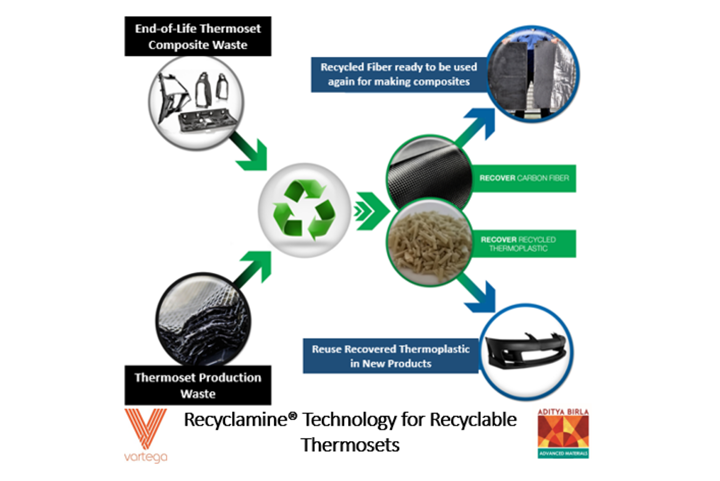Aditya Birla Advanced Materials, Vartega develop a recycling value chain for thermoset composites
Cost-effective recycling of epoxy-based thermoset products to be achieved via Recyclamine, which uses novel amine-based curing agents to reuse both reinforcement and matrix across a range of industries and manufacturing processes.

Photo Credit: Vartega
Aditya Birla Advanced Materials (Rayong, Thailand), a part of Aditya Birla Group (Mumbai, India), and composite materials recycler Vartega (Golden, Colo., U.S.) have recently signed a memorandum of understanding (MoU) to partner on recycling and developing downstream applications for composite products based on Aditya Birla’s patented Recyclamine technology. The collaboration aims to develop an ecosystem of recycling and recycled epoxy-based thermoset products using Recyclamine.
Applications that use thermoset composites face the compelling issue of non-recyclability at the end of their useful life. This issue can be addressed by Recyclamine technology, Vartega and Aditya Birla state, which enables a fully recyclable epoxy thermoset simply and cost effectively. For example, when Recyclamine is recovered, both reinforcement and matrix can be reused, promoting a circular supply chain. As a platform chemistry, Recyclamine technology is applicable across a range of industries as well as manufacturing processes including infusion, compression molding, hand layup, HP-RTM, VARTM and pultrusion.
“Recyclamine is a groundbreaking technology in the epoxy composites space, which will drive the industry towards a more sustainable future,” says Pradip Kumar Dubey, senior president, Aditya Birla Advanced Materials. “This partnership can provide solutions to a critical piece of the puzzle for us, as our customers will know how to deal with end-of-life and process waste coming from using Recyclamine and know where they can send their composite waste to create value.”
Vartega says it is making composites more sustainable by aiming to solve recycling challenges. Across its broad technology portfolio, Vartega recycles various composite materials including wind turbine blade manufacturing scrap, bicycle scrap and carbon fiber waste (see “Braskem, Vartega launch new carbon fiber recycling program for 3D printing filament”). Vartega’s patented recycling system was specifically developed to recover high-value fiber reinforcements as well as resin systems such as Recyclamine. Through this collaboration, Vartega will leverage its modular hardware-as-a-service recycling platform to connect a captive supply in the waste stream to an unmet demand for low-cost composite materials downstream in applications such as sporting goods, additive manufacturing (AM) and lightweight automotive applications.
“It’s been exciting to watch the development of the Recyclamine technology over the past several years,” says Andrew Maxey, CEO, Vartega. “We knew very early on in working with Recyclamine that it was special and has the potential to fundamentally change the sustainability of composites. The investments that Aditya Birla has made in this technology are critical for the innovation of recyclable thermosets. This collaboration will further accelerate those efforts.”
The partnership will serve to build circular supply chains for composite materials in the North America region, with the goal to solve the problem of recyclability of thermoset composites, making the recycling process more efficient and enabling downstream usage of recycled materials for high-performance applications.
Related Content
-
Combining multifunctional thermoplastic composites, additive manufacturing for next-gen airframe structures
The DOMMINIO project combines AFP with 3D printed gyroid cores, embedded SHM sensors and smart materials for induction-driven disassembly of parts at end of life.
-
TU Munich develops cuboidal conformable tanks using carbon fiber composites for increased hydrogen storage
Flat tank enabling standard platform for BEV and FCEV uses thermoplastic and thermoset composites, overwrapped skeleton design in pursuit of 25% more H2 storage.
-
Bio-based acrylonitrile for carbon fiber manufacture
The quest for a sustainable source of acrylonitrile for carbon fiber manufacture has made the leap from the lab to the market.
















